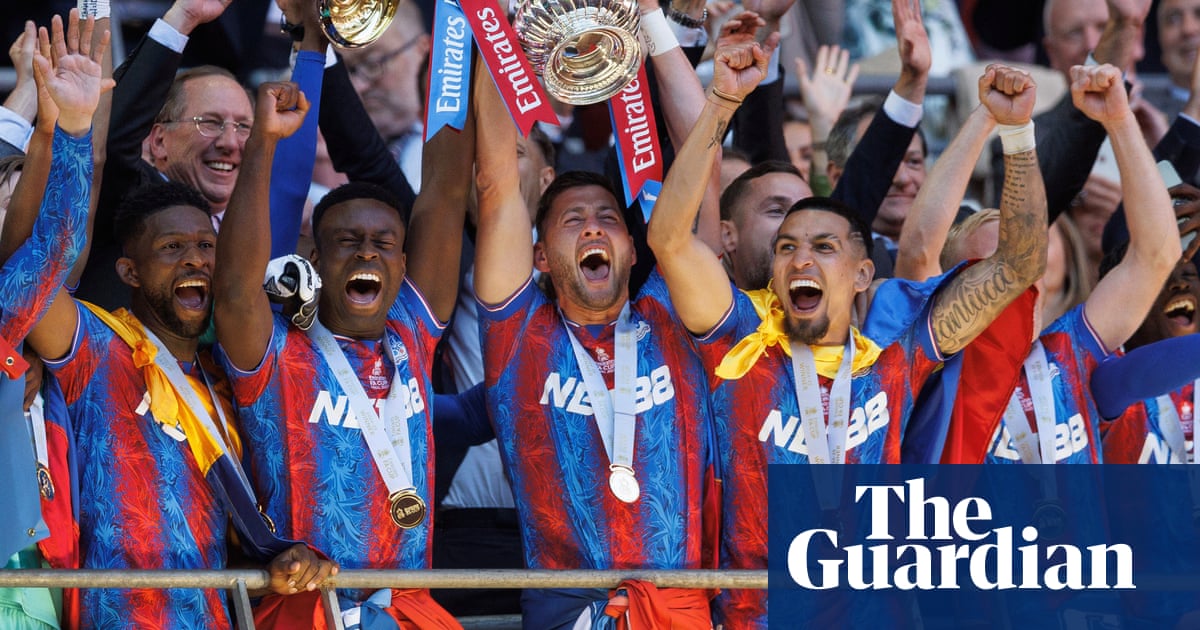Uefa has rejected offers fromCrystal Palaceshareholders John Textor and David Blitzer to put their shares in a blind trust to ensure the club can compete in Europe next season.
Palace’s participation in theEuropa Leaguehas been cast into doubt as the club’s largest shareholder Textor is also the majority owner of Lyon, who have also qualified for the second tier competition. And to compound matters, Blitzer’s Danish club Brøndy have qualified for the Conference League, so the prospect of the FA Cup winners dropping into that competition is also not an option due to the European governing body’s multi-club rules.
Palace executives, including Textor and chairman Steve Parish, met withUefaofficials in Nyon on Tuesday to try to broker a solution without reaching a resolution. The Guardian has learned that the so-called blind trust option in which Textor’s Palace shares would be placed in the hands of trustees next season was rejected by Uefa, as the club missed the deadline for registering the trust.
Manchester City and Manchester United both used blind trusts to ensure compliance with Uefa multi-club rules last season after their partner clubs, Girona and Nice, both also qualified for the Champions League and Europa League respectively, while Nottingham Forest owner Evangelos Marinakis alsotransferred his shareswhen Nuno Espirito Santos’ side and his Greek club Olympiacos looked on course to qualify for next season’s Champions League.
Uefa rules state that such ownership changes must take place before 1 March to take effect in time for the following season, however, with Palace told this week that they will not be shown any flexibility. European qualification was not on the agenda for Palace before March, as they were mid-table in the Premier League and had not progressed beyond the FA Cup fifth round.
Palace are in danger of paying a heavy price for their lack of foresight, leading to considerable frustration at Uefa’s lack of flexibility.
Uefa declined to comment, but sources at the European governing body stressed that given more than 300 clubs take part in its competitions each season, it has to ensure that the regulations are applied consistently.
Textor told the Daily Mail after Tuesday’s meeting that he is looking to sell his 45% stake in Palace, but there is little realistic prospect of that happening in time to influence Uefa’s decision, with the Europa League qualifying draw due to take place on 17 June.
Just three weeks ago on the eve of the FA Cup final, The Guardian revealed that Textor was seeking tobuy out fellow American shareholders, Blitzer and Josh Harris, who own 36% of the club between them.
The two parties have previously held on-off talks about buying each other out, but have never got close to an agreement on price. Textor also signalled his intention to sell Palace when he wasattempting to buy Everton last summerwithout making any discernible progress.
Sign up toFootball Daily
Kick off your evenings with the Guardian's take on the world of football
after newsletter promotion
With a quick sale and the transfer of shares seemingly off the table, Palace’s best hope of playing in the Europa League for the first time appears to be persuading Uefa that Textor has no influence at Selhurst Park, although this may not be straightforward. In addition to his 45% stake Textor has 25% equal voting rights with Parish, Blitzer and Harris, and is known to have played a key role in the appointment of the manager Oliver Glasner last year. Textor has declined to comment.
Uefa rules make clear that any influence at two clubs in the same competition is prohibited. “No one may simultaneously be involved in any capacity whatsoever in the management, administration, and/or sporting performance of more than one club participating in a Uefa club competition,” the regulations state.
“No individual or legal entity may have control or influence over more than one club participating in a Uefa club competition, (including) holding a majority of the shareholders’ voting rights; having the right to appoint or remove a majority of the members of the administrative, management or supervisory body of the club; being a shareholder and alone controlling a majority of the shareholders’ voting rights pursuant to an agreement entered into with other shareholders of the club; or being able to exercise by any means a decisive influence in the decision-making of the club.”In the event of Palace being barred from the Europa League, Forest could be promoted to take their place after qualifying for the Conference League by finishing seventh in the Premier League. Palace’s rivals Brighton, who finished eighth, could then replace Forest in the Conference League.
Palace’s European position is under threat rather than Lyon’s, as Uefa rules state that the club ranked highest in its domestic championship will be given entry to the competition. Lyon’s sixth-place finish in Ligue 1 gives them precedence over Palace, who came 12th in the Premier League.
